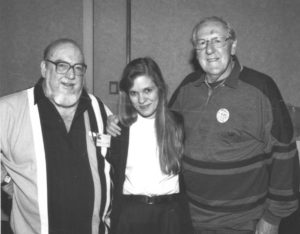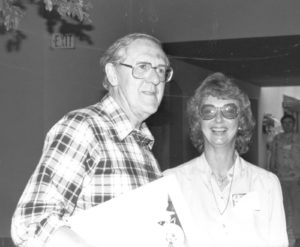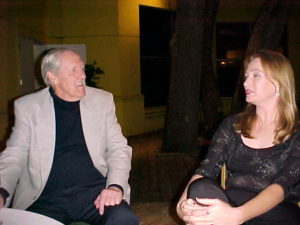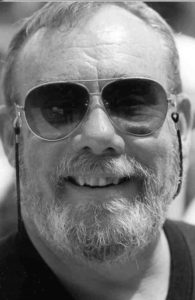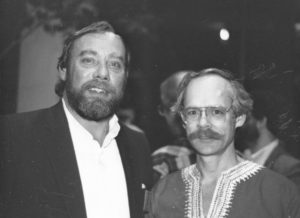“What still is the look of things”: A Reflection on Michael M. Levy
By Judith Collins
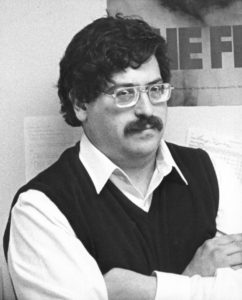
Mike Levy, ICFA 8, 1987, photo courtesy of FAU Special Collections, the Robert A. Collins Collection
I first saw the name Michael M. Levy in June of 1985. It appeared at the top of a type-written book review, possibly of The Glass Hammer by K.W. Jeter. My summer job consisted of “punching in” the book reviews for Fantasy Review, a small, “semi-pro” fanzine with offices at Florida Atlantic University. At the behest of a seriously OCD Editor, I would sit for hours with a stack of typed manuscripts at my side, staring at a green DOS screen connected to two eight-inch floppy drives that comprised the essence of a 1984 Xerox personal computer, and I would type. Three issues worth of reviews that summer acquainted me with several recurring names – names I still remember. Michael M. Levy from the University of Wisconsin at Stout, was the most prolific of them. Since the OCD Editor was also my dad, I viewed all the people involved with the magazine as family friends, and at the time, the impression I had of Mike Levy was of an old friend, someone who was always there and would always help, someone my dad could count on. My reason for believing this was little more than a feeling about a name on a page, but I wasn’t wrong.
About twenty years later, when Mike had long since established himself as a presence in the field of science fiction and fantasy scholarship, my dad referred to him once, in casual conversation, as “Good ol’ Mike,” and while this may sound a bit bland, my dad meant it as the most exalted of compliments. The emphasis was on the “good,” but with the “ol’” sounding in the background as a significant modifier – not one that emphasized age (Mike was twenty years younger than my dad) but one that emphasized the length of time my dad had known Mike to be “good.” In the ten or so years since then, I, too, have had many opportunities to witness Mike’s “good”-ness, and it was vast.
Mike’s faculty vita page on his University’s web site, lengthy as it is, is a serious understatement. Since those early days in the 1980s when he was a newly minted Ph.D. writing book reviews for an obscure semi-pro fanzine in Florida, Mike has written and co-written numerous books, book chapters, and journal articles. He has served as Co-Editor and then Managing Editor for Extrapolation. He has served as both Treasurer and President of the Science Fiction Research Association. He has also reviewed many, many more books, seemingly constantly, not only for academic presses, but also for Publishers Weekly, Science Fiction Studies, Extrapolation, Los Angeles Review of Literature, multiple children’s literature journals, The New York Review of Science Fiction, The Journal of the Fantastic in the Arts, and many others, as well as written the introductions to at least four science fiction and fantasy book review anthologies. And of course, Mike was both Vice President and President of our own International Association for the Fantastic in the Arts – which my dad founded, and on behalf of which, my dad had much reason for gratitude to Mike Levy.
Mike first attended the International Conference on the Fantastic in the Arts in 1987, when he chaired one session. He does not appear on the program again until 2000. From that moment, however, his presence at the conference and his indispensability to our association became constant. By the time the 24th ICFA began in 2003, Mike had not only organized the conference program as Vice President but had been instrumental in establishing an entire Division focusing on children’s and young adult literature, one of his many passions. By the time the 26th ICFA began in 2005, Mike was President of the organization. What many may not realize, however, is how vital to that organization Mike’s Presidency was.
In the previous decade, the organization had struggled with change. Then Mike came on the scene, and . . . well, he was Mike. He advocated for all groups and all people. He balanced respect for the conference as it had been with foresight about what it could and should become, and during his ultimately eight-year tenure on the IAFA Executive Board (two years as Vice President, three as President, and three more as Immediate Past President), the ICFA grew substantially.
The IAFA, however, is only one example of Mike’s ability to transform people and their endeavors. Sherryl Vint, the IAFA’s current President and Mike’s colleague both in the SFRA and on Extrapolation, has called him “a social glue that held together our at-times difficult communities through his warmth and kindness and compassion for people, his curiosity about ideas and their authors, his quiet way of just making everything better.” Farah Mendlesohn, Mike’s co-author and immediate successor as IAFA President, credits him with “great gravitas and wisdom” and says that she would often “turn to him for advice on career moves, on projects to take up, and for sorting through in my head what kind of person I did and did not want to be.” His fellow editors at Extrapolation have said that Mike was “a great mediator, a man who seemed to have a good word for everybody . . . unfailingly generous in his time and advice. To many of us he was a mentor, but in such a way that it always felt like friendship rather than being taught.”
The recurring theme in all these tributes is Mike’s ability to serve many people in many capacities all at once. He understood that everyone he met was a whole person, with professional ambitions, individual interests, and personal histories, and he didn’t feel the need to separate these things. Whether or not a person should take on a job or continue with it, how a person should write or edit an article for publication, or in what ways a person should direct his or her life – Mike understood how these questions overlap and intertwine, and he was not only undaunted by the magnitude of ever-widening circles of human connectivity; he was inspired by it.
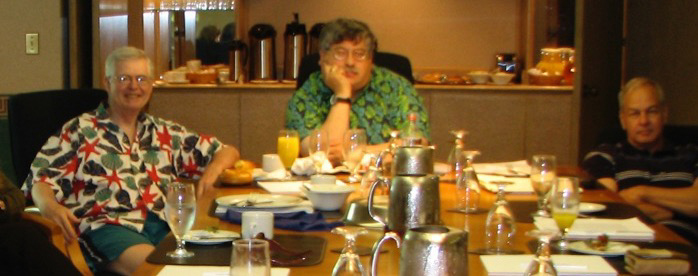
David Hartwell, Mike Levy, Bill Senior, June Board meeting 2006, photo courtesy of David G. Hartwell
Mike loved thinking. In even the most casual conversation, if he heard you say something that interested him, even something you considered inconsequential, he would follow it up. He would tell you a story of his own which in some small way explained his perspective, and then he would ask for yours. And you would give it, because even if your perspective was different from his, you knew he wanted to understand, not judge. You knew that his comparisons did not emphasize the contrasts. And you knew that whatever conclusions he might draw would likely incorporate rather than divide.
His approach to the people whose lives he touched was therefore always one of inclusion and connection. He recognized people’s strengths simultaneously with their sometimes crippling neuroses and simply added all of it to his understanding of them as whole people. He loved and respected people for everything he knew about them. He saw the best in us when others might have seen only our worst, but he also took that insight one step further, understanding that someone’s best and worst qualities were often the same thing, stemming from the same source, woven intricately together in the same whole person.
To say that Mike Levy was caring and thoughtful is certainly true, but those words, “caring” and “thoughtful,” have become so ordinary that they struggle to describe the depth of Mike’s care and thought. The same could be said of the phrase “Good ol’ Mike,” but then, Bob Collins, Editor of Fantasy Review and Founder of the International Conference on the Fantastic in the Arts, also understood the worth of real care and real thought.
Between 1984, when Fantasy Review began printing book reviews, and 1987, when the magazine folded, reviews by Michael M. Levy appeared in 28 out of 36 issues, often two per issue, sometimes even three. Just to acknowledge the obvious for a moment, that means Michael M. Levy not only read but also thought and wrote analytically about at least one fantasy or science fiction novel per month, and he continued doing so for the rest of his life. I don’t for a minute believe those books he reviewed were the only ones he read, nor will I believe they were the only ones he thought about in depth. Nor can I imagine that, at any point in Mike’s career as a scholar, he ever solidified an opinion or a thought pattern or a position – on anything or anyone. Mike was a thinker. Thought was his way of living. And he cared too much about people – authors, scholars, characters in books, as well as friends and family – ever to allow his thoughts to dig in their heels and stay put. For Mike, thinking meant ever-widening circles. To think about something new meant that one had to allow new thoughts to join the old ones. Every book review Mike sent to my dad in those early years showed Mike’s care and thought. Everything my dad had seen Mike do since then showed the same care and thought. Mike’s ability and desire to think and to care were what caused my dad to consider Mike “good.” The fact that Mike’s ability and desire never faltered explained the “ol’.” “Good ol’ Mike” was a constant, steady, strong, unfailing force of all that was “good.”
And yet Mike was also, perhaps most importantly, a quiet man, which of course enabled him to listen, think, and analyze clearly, but it also allowed the astonishing breadth of his achievements to . . . not go unrecognized, exactly, but perhaps . . . be taken for granted in communities where others of us are louder. His quiet manner most often resulted in positive outcomes for ideas, organizations, and people in his world, but I suspect they also spoke – or perhaps whispered – of very little desire for attention. His lengthy but nowhere near all-inclusive faculty vita page and his befriending of so many people from so many backgrounds and of so many levels of influence all signify a man whose satisfaction came from doing the “good” rather than giving himself credit for it. It came from the people and the ideas Mike Levy learned about and shared rather than from the rewards academia would offer to Michael M. Levy for the results.
Where people in Mike’s many circles have needed something, where there has been emptiness, confusion, urgency, or even strife, Good Ol’ Mike has stepped in – quietly – and more than once, saved the day.

Sandra Lindow, Miriam Levy, Mike Levy, ICFA 36, 2015, photo by Bill Clemente

